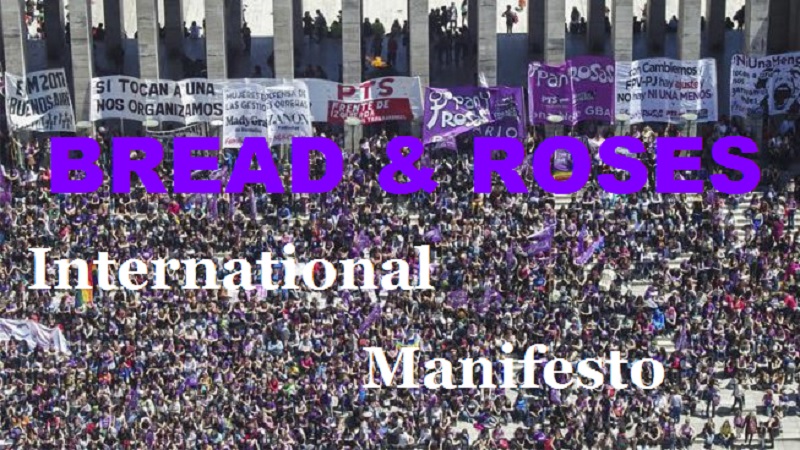In response to the call for an International Women’s Strike, on March 8, 2017, International Women’s Day, we were in the streets and on strike in various countries.
These huge protests did not fall from the sky — they come from the recent mass mobilizations of women against sexist violence and femicide in Argentina, Chile, Mexico, and Italy, and for reproductive and abortion rights in Poland, Ireland, and South Korea. Women mobilized against the wage gap in France and Iceland, and there were massive mobilizations in the US against Donald Trump. The Women’s March against the incoming President took place in cities across the US as well as in cities around the world such as London, Barcelona, Berlin, Amsterdam, Budapest, and Florence. In these protests, women also expressed resistance against the capitalist crisis, which was created by the ruling class but is being paid for by the working class via cuts, layoffs and austerity. The capitalists and their governments attack the living conditions of workers and the poorest sectors of society.
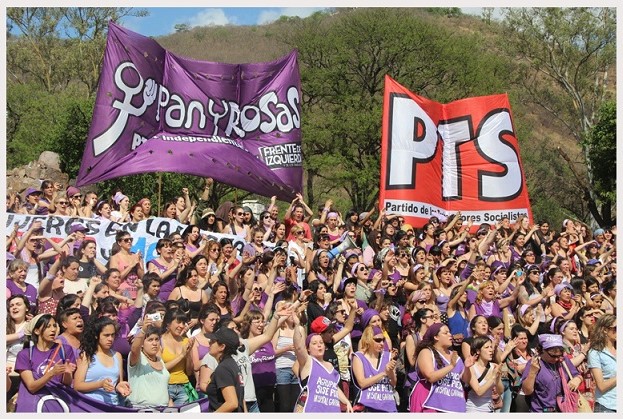
March 8 also marked the Centennial of the Russian Revolution which began on International Women’s Day of 1917 with a textile workers’ strike in St. Petersburg. This process culminated in the October Revolution, when the working class took power. It was a revolution that, in a few months, secured rights and freedoms that today, 100 years later, we are still fighting for throughout the world.
The women who support this manifesto reclaim the tradition of the Russian Revolution and consider it more relevant than ever in the fight for our emancipation. We are convinced that we will win our freedom only when we erase all vestiges of a society based on exploitation and the oppression of millions of human beings, and that we can build, on the ruins of the old society, a new socialist society.
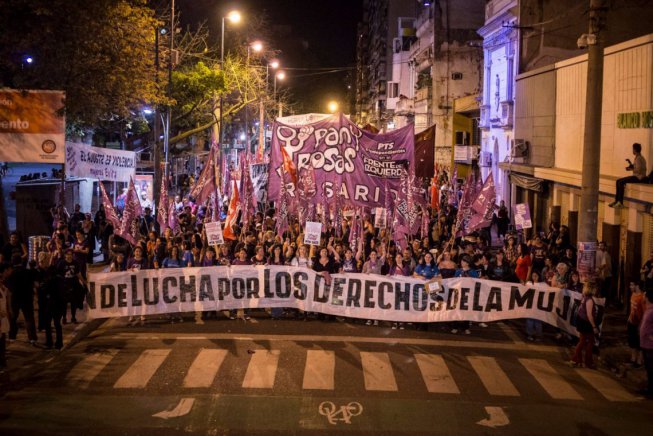
The History of Class Struggle is also Women’s History
These mobilizations of women around the world are not a new trend. Throughout history, women have resisted the discrimination and inequality imposed by patriarchy. During the 17th, 18th and, 19th centuries, European peasant women rebelled against scarcity and the high prices of bread and flour that condemned their families to hunger and misery. In Latin America, there are numerous stories of courageous indigenous women who resisted colonial rule. In the Americas, many slave women rebelled against the system that kept them enslaved, as well as against their “masters”. In the time of the French Revolution of 1789, bourgeois women denounced the Declaration of the Rights of Man and of the Citizen for failing to address women’s rights. Almost a century later, the working class women of Paris heroically built barricades at the Commune of 1871, defending the first workers’ government in history. The Paris Commune recognized women as citizens with equal rights. In turn, women organized battalions that fought until the French bourgeoisie brought the Commune to a bloody end.
Before the First World War, millions of women — especially, though not exclusively, those of the most privileged classes — mobilized in England, France, and other countries, demanding the right to vote. In the U.S., many of these suffragists also fought for the abolition of slavery, facing racist prejudices. Black women organized for the right to vote, facing racism within the women’s movement. They also organized against racist lynchings, as well as for other basic civil rights. Across Latin America and the Caribbean, women fought for access to higher education and for all the rights that they were denied. In many cases, these women found their demands reflected in the socialist parties of the time. In Europe during WWI, women workers fought against sending troops to the battlefront by organizing mutinies and revolts to stop trains and by sabotaging the production of arms and munitions. They were on the front line of the protests against shortages and the high cost of living due to the military conflict.
Likewise, textile workers from Saint Petersburg, Russia commemorated International Women’s Day in 1917 by declaring a strike and demanding, “Bread, Peace, and down with the autocracy!” The most oppressed among women and the most exploited among workers opened the way for the greatest revolution in the history of the workers’ movement: the Russian Revolution, which was led by the Bolshevik party of Lenin and Trotsky. The Revolution ended the Czarist regime and a few months later, created a government of workers based on workers’ councils. Women gained rights that, a century later, women in most capitalist democracies are still struggling to obtain.
History is full of heroism and courage of millions of anonymous women and LGBT people as well as others whose names we do know, like brave Aymara fighter Bartolina Sisa in Bolivia, escaped slave Harriet Tubman, Stonewall hero Sylvia Rivera, socialist workers Teresa Flores of Chile and Carolina Muzzilli of Argentina, Zapatista general of the Mexican Revolution Amelio Robles, U.S. organizer Mother Jones, French-Peruvian feminist Flora Tristán, Communards Elizabeth Dimitrieff and Louise Michel, European revolutionary internationalists Clara Zetkin and Nadezhda Krupskaia, and women who confronted and opposed Stalinism such as Nadezhda Joffe of Russia, Marvel Scholl and Clara Dunne of the U.S., Patricia Galvao of Brazil, and Pen Pi Lan of China. Not all of them were feminists, but all faced oppression and fought alongside exploited people, struggling for their rights and emancipation. Not all held a revolutionary socialist perspective, but the women of Pan y Rosas look to them and their struggles for inspiration.
We carry with pride the legacy and tradition of women like Rosa Luxemburg who, overcoming enormous adversities, demonstrated with her life that oppression is not an absolute impediment for a woman with strong convictions. These convictions, her courage and her dedication made her one of the greatest revolutionary leaders in history.
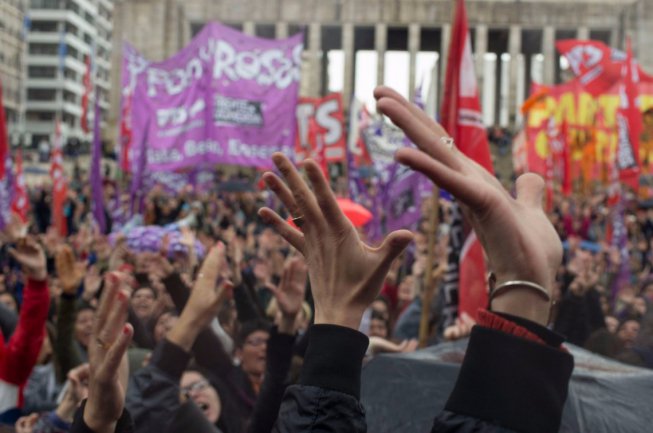
More Rights and Greater Grievances: The Contradictory Legacy of Women in the Past Few Decades
In the last half of the century, life for the majority of women in the West — especially those in the core countries and large cities — changed in a way that, just a century before, had been unthinkable (1). In only a few decades, the laws that barred women from education and public office were toppled as a result of women’s struggles. Women gained democratic rights and became legally independent of the patriarchal guardianship of father and husband. In many countries, women won rights that allowed them to decide their own life projects and make choices about their bodies and sexualities.
There was no linear process of women gaining more rights and nor do these rights extend to all women equally. Yet, it is important to recognize how the capitalist class has included women in its highest ranks of representation. Women such as Angela Merkel of Germany and Theresa May of Great Britain, representatives of two of the most important imperialist countries in the world, have been instrumental in enacting the ruling class’s ultra-reactionary policies. Today, there are almost no legal impediments to women’s access to any position of power, with the exception of the chair of St. Peter in the Vatican. These gains are a marked departure from the epoch in which revolutionary socialists like Rosa Luxemburg combatted the imperial German regime, when women and students had been prohibited from participating in political organizations and attending meetings where politics would be discussed.
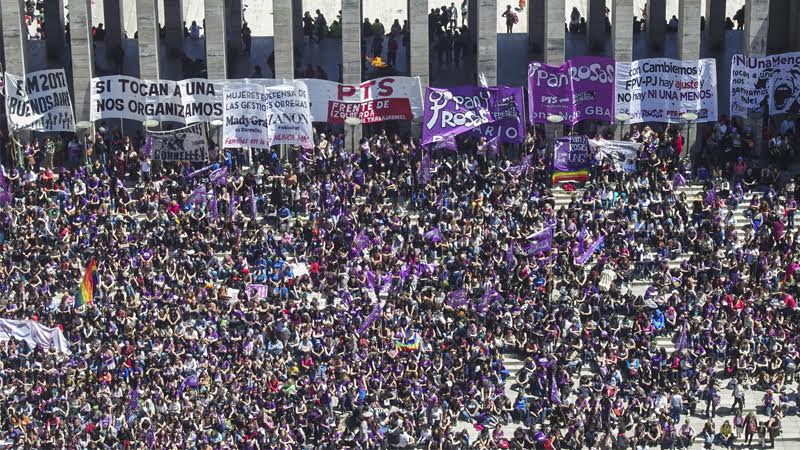
Many of the rights gained are a result of the women’s movement of the ‘60s and ‘70s that was able to conceptualize and consolidate, a program of struggle in the slogan “the personal is political.” Women’s political, economic, social, cultural, and sexual inequality is not a problem unique to each individual woman and man. Sexism is not restricted to interpersonal relations in the private sphere. Sexism is a pattern that was replicated in countless individual stories. Each individual experience dialectically demonstrates its true structural character; what was postulated as “natural” was the crystallization of complex socio-historical processes (2).
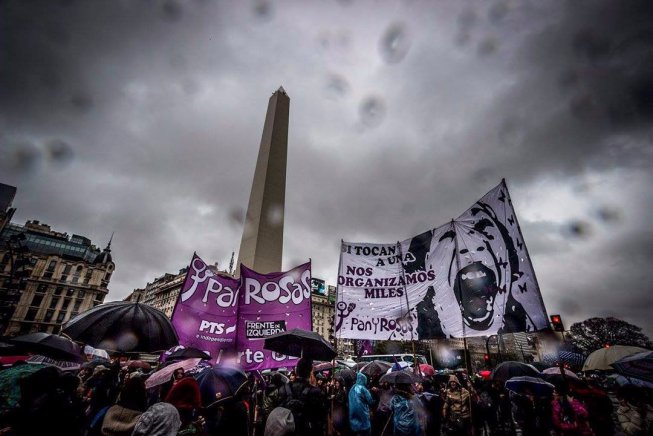
In the 60’s and 70’s, patriarchy as well as imperialism, racism, and heteronormativity were questioned. This occurred in the midst of great social and political radicalization of the masses that rose up against capitalist exploitation in the West and the oppression exercised by the Stalinist bureaucracy in the worker states of Eastern Europe. In colonies and semi-colonies, people rose up against imperialism.
The changes that were achieved in the daily life of millions of women are seen by some analysts as truly “revolutionary” in comparison with the lives of the women of previous generations. However, it is evident that they did not radically transform society or eliminate patriarchal oppression. The movements of the 60’s and 70’s were unable to end the capitalist exploitation that keeps millions of humans in the barbarism of hunger, wars, contamination, floods and droughts, unemployment, and misery. Today, of the 1.5 billion human beings who live in extreme poverty, 70% are women and girls.
Without addressing gender oppression and its capitalist roots, women’s rights victories coexist in stark contrast with persistent sexism and patriarchal violence; 1.5 -3 million women are victims of sexist violence each year. Despite groundbreaking advances in science and technology, 500 thousand women die annually due to pregnancy complications, and 500 women die each day due to unsafe and clandestine abortions. Prostitution has become an industry of huge proportions and immense profits. At the same time, sex trafficking has also expanded, especially targeting poor girls and young women in semi-colonial countries. Of the world’s 960 million illiterate people, 70% are women and girls. The number of women in the workforce increased dramatically — women are now 40% of the labor force and 50.5% of these women engage in low wage, precarious labor. Women work a “double-shift” — first, several hours at their official job and then more hours of domestic labor at home.
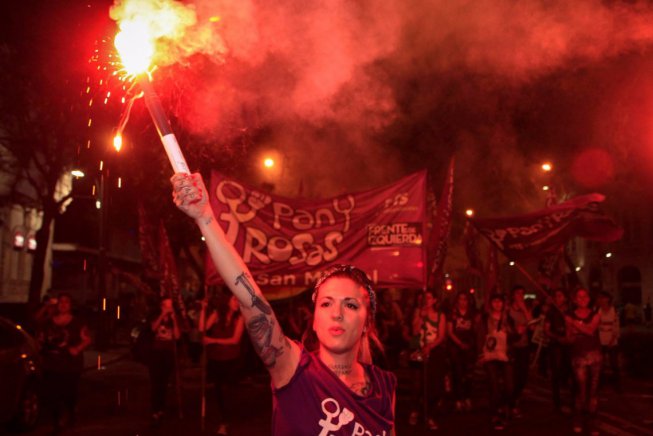
Recently, we have seen a political turn to the right in several countries that seek to further roll back women’s rights. For example, in the U.S., Donald Trump’s administration is seeks to completely deny women the right to an abortion, building on the offensive carried out by state governments during the Bush and Obama administrations. In Europe, right-wing Christian fundamentalists have galvanized large demonstrations against the right to an abortion, same sex marriage, and other democratic and civil rights.
These are the results of the cooptation and defeat of the previous era of class struggle and mass radicalization from which feminism emerged. Neoliberalism is nothing more than the furious reaction of capitalism to the wave of mobilizations, strikes, wars, and revolutionary processes that shook capitalist hegemony in the 70’s.
From the treacherous hand of the reformist leadership of the masses — politicians as well as unions — capitalism managed to survive its crises, imposing economic policies that pushed millions into unemployment. The working class was fragmented and jobs were relocated, reinforcing individualism and the “save yourself if you can” ideology as class struggle waned. To impose this defeat, the ruling classes relied on the collaboration of the traitorous leaders of the exploited classes, particularly Stalinists and the social-democratic parties of the imperialist European countries. The ruling classes also made concessions in order to assimilate, co-opt, and weaken the most subversive aspects of these social movements that questioned patriarchal, heterosexist, transphobic, racist, and colonialist capitalism. From this perspective, the rights won within the capitalist system were a kind of recognition by the dominant classes of the new political situation imposed by the masses. Women’s victories were response to this discontent and the growing number of women in the workforce. Capitalism tried to resolve the need for an increased supply of labor by increasing competition between wage laborers and attacking the historical gains of the working class. Capitalists used the same mechanisms they always have to:develop an “industrial reserve army” to lower salaries and divide workers along gender lines, legal status, etc.
The late 80s and 90s marked the divorce between the working class and the social movements, which had a long history of shared struggles. Feminism abandoned the struggle against capitalism, which imposes misery and violence on women. On the other hand, the absence of a revolutionary horizon and the betrayal by their own leadership subsumed the working class in narrowly defined economic struggles. Women who longed for emancipation during these decades of conservative restoration did not have a model to follow. The “real socialism”, which was no socialism at all in Stalinist bureaucratic workers’ states, was anything but liberatory to women, leading many to believe that socialism was not the way to women’s emancipation. They only saw confirmation that every attempt to oppose the existing system would create new and monstrous forms of domination and exclusion. Stalinism re-established the familial order and promoted women’s role as wives and mothers. The right to an abortion was taken away, and prostitution was criminalized as it had been in the days of the czar. Stalinism drastically reduced or altogether did away with public laundromats, cafeterias, and communal housing. It demolished all women’s organizations within the party. These are only a few of the advances that the Stalinist bureaucracy destroyed after the gains of the Russian Revolution of 1917.
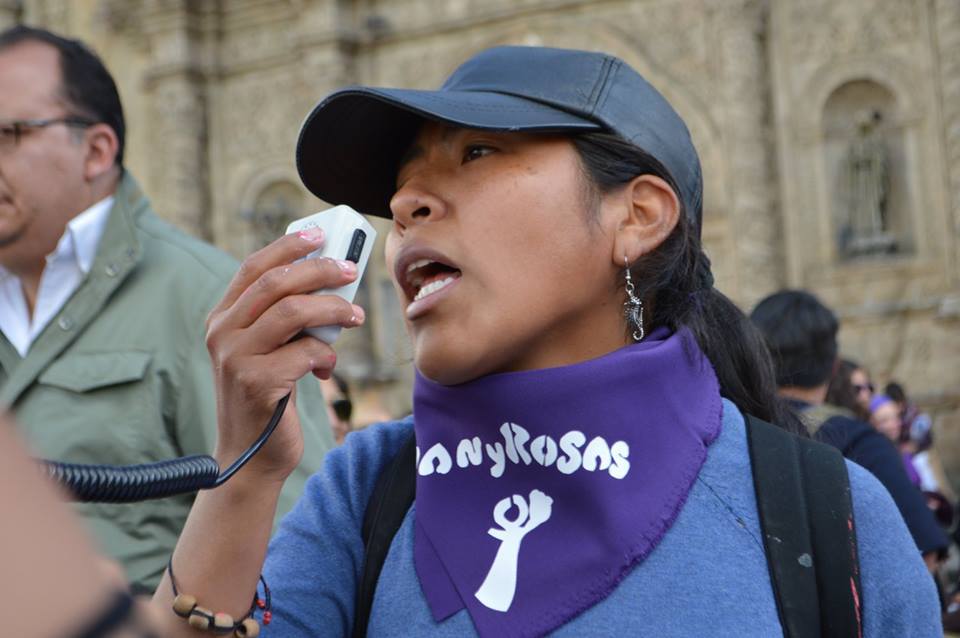
Because of the bureaucratization and eventual defeat of degenerated workers states, the idea arose that capitalism was invincible, and any strategy that called for the radical transformation of the conditions of the exploited and the oppressed was considered utopian. We cannot deny that the rights that were gained during the 20th century (although only fully enjoyed by a few and in permanent danger of being rescinded) mark some degree of victory. On the other hand, they served to solidify a deeper and more fundamental defeat in the form of neoliberalism. When radical transformation was eliminated from the imagination of the masses, the idea of emancipation was abandoned and exchanged for a strategy of progressive reforms and accumulation of rights, promoting an entirely utopian strategy of change “from within” the system. This was the real utopianism. The radical critique of capitalism transformed into demands for the expansion of citizenship rights within degraded capitalist democracies that had little or nothing to offer to alleviate the grievances of the masses. Social movements chose this path because the cultural, social, and moral order founded on the relations of capitalist production were seen as separate from the economic order of exploitation that sustains it, a system which remained unquestionable after the fall of the USSR and the defeat of the movements of the 70’s.
This gave rise to a feminism that sought rights in the terrain of the “democratic state”. This kind of feminism became hegemonic during the decades of neoliberalism. The “democratic state” is not a neutral force; it is capitalist and a ensures capitalist profits through the use of violence. The “democratic state” ensures the exploitation of millions of human beings by a parasitic minority ruling class. It is founded on the protection of private property and monopolizes the right to violence against the exploited.
In this current epoch, we obtained the legal recognition that marital rape is violence and not a spousal right, that sexual abuse is violence and not a cultural custom, and to some degree that street harassment is violence and not an insignificant offense. Paradoxically, in demands for recognition from the state of violence against women, a result opposite to what was fought for was obtained. Even though women have rights that were previously non-existent and women’s suffering under patriarchal oppression is more visible, patriarchal violence is framed as an individual problem and is punished as an individual crime as the rules of the bourgeois penal system demand.
After decades of fighting to de-naturalize the oppression of women, to demonstrate that sexism is structural in class-based societies, and to reveal that patriarchy is a system that permeates our lives and interpersonal relations, the most extreme, violent, and even lethal behaviors of certain individuals were highlighted, allowing capitalist and patriarchal society (with its state and institutions) to remain unsullied and free from all responsibility. It is as if patriarchal capitalism speaks to women, telling them: “the capitalist democracies have already conceded you the right to equality before the law; emancipation is an individual problem for which you alone are responsible.”
The conservative right wing has also created its own “feminism” based on the liberal conception of meritocracy, empowerment, and equal opportunity. Even Ivanka Trump wants to “help change the system to make it better for women” by empowering women to make it to top positions in the workplace. This is the strategy that liberal feminism has used for years. Thus, liberal feminism is incapable of confronting right wing attacks because it falls victim to its own logic.
But as is shown in recent mobilizations of women throughout the world and in Trump’s rise to the presidency, the “corporate feminism” associated with Hillary Clinton and the Democratic Party is in crisis. We need a feminism that seeks to become a political movement of the masses, taking up the demands of the vast majority of women, not representation for a select few. Only a feminism in which democratic freedoms are connected to a denunciation of this system of exploitation and misery for the majority, and which has the goal of overthrowing it, can be truly emancipatory.
Reform and Punishment: A Reactionary Utopia
Finally, we convinced the political regime with all its institutions — including penal law — to recognize us as victims of sexism. And it is true that women are still victims of gender violence, of kidnapping by human trafficking networks, of harassment and sexual abuse, and of rapes in the streets, in schools, in offices, in churches, and at home. We are victims of exploitation that becomes unbearable and destroys our health and our lives. We are collateral victims of wars, and we are victims of femicides.
Patriarchy insists that we are, and that we should consider ourselves, helpless victims. We are victims of sexim and sexist violence, and then the state further victimizes us in court, in police stations etc. From victim to victimized, the powers that be want us to believe that we are powerless to radically transform the basis of our oppression. They want us to limit ourselves to demanding that the state apply individual punishments to the perpetrators of violence, thereby complying with the same institutions that legitimize and maintain our subordination. To achieve this requires erasing many generations of women’s struggle. It requires instilling resentment for men and breaking the ties of solidarity with other exploited women who are oppressed by capital. In order to take up the strategy of punishment and reform, we must ignore the horrendous conditions in which most women live, thus removing what has been the source of women´s resolve to fight throughout history.
The women of Pan y Rosas refuse to be the powerless victims that the patriarchy demands. The conditions that “victimize” us are also the source of the productive hate towards an oppressive social order and stirs powerful convictions to act in solidarity with millions of others around the world. It is hate that has always fueled the insurrections of enslaved men and women throughout history. At the end of the 19th Century, the communist Louise Michel said: “Be careful with women when they are disgusted, when they are sick of everything that surrounds them and revolt against the old world. That day will give birth to the new world.” We, the women of Pan y Rosas, fight for this new world and to free ourselves from the shackles that today constrict the muscles of all humanity and weigh doubly on women.
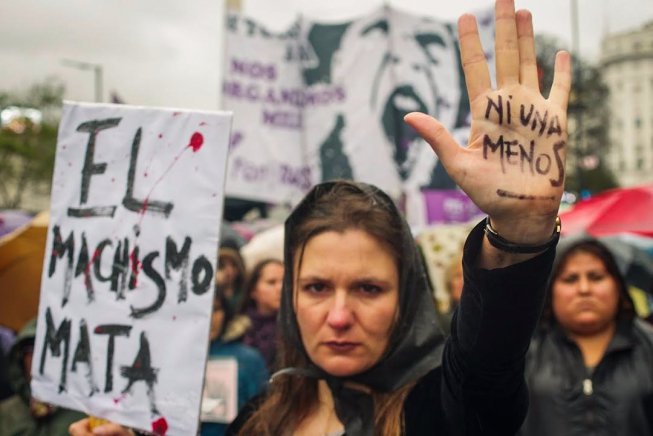
We do not ask, we demand the right to bread as well as roses.
Pan y Rosas is an international organization of women from Argentina, Brazil, Chile, Uruguay, Bolivia, Mexico, and Spain. We are militants of currents in the Trotskyist Fraction- The Fourth International who, along with unaffiliated women workers and students, share the idea established by the American socialist Louise Kneeland who in 1914 said: “the socialist who is not a feminist, lacks breadth; the feminist who is not a socialist lacks strategy.” In other words, we believe that only a revolution that ends this system of exploitation can establish the basis for the emancipation of women.
Ni Una Menos (Not One Less)
The women of Pan y Rosas are on the front lines of the struggle for the democratic rights and liberation of women. We combat sexist prejudices among working class people, instilled by institutions that enforce the domination of the ruling class and embed its agents within the ranks of the proletariat.
Unlike other self-proclaimed left currents, we do not believe that the fight for our rights should be postponed until “after the revolution,” or until “after the taking of power,” as suggested by Stalinism and many populist currents. While we fight for a system in which neither exploitation nor oppression exist, it is our duty to advance struggles by and for women, seeking the best possible conditions and fundamental democratic rights within the current system.
This is part of our daily political practice; in Argentina, we joined with other Trotskyist parties to form the Frente de Izquierda y los Trabajadores (Left and Workers’ Front). There our comrades have gained recognition for their role in the National Congress and various smaller legislative bodies, using their posts to act as tribunes and to support struggles for women’s rights. They propose laws for pay equity between men and women, for an emergency plan for women who suffer domestic violence, as well as attending protests and mobilizations that support women’s rights.
Additionally, we have spoken out against groups that claim that the independent organization of women “threatens” the unity of the working class. On the contrary, we believe that when a woman is humiliated, raped, or experiences discrimination from other workers, the working class is further weakened. But when women workers take the fight for their rights into their own hands, the entire working class is in a stronger position from which to confront the exploiters. It is not our fight against sexism that divides us, but rather it is the dominant class that foments misogynist, sexist, homophobic, xenophobic, racist, and nationalist prejudices and divides the exploited.
The rates of violence against women, especially girls and young women, are exorbitantly high. This includes psychological, physical, workplace, and sexual violence in addition to femicide, one of the primary causes of death among women. In the majority of these crimes, the perpetrator is a man who is close to the victim. This is the last lethal link in a long chain of violence against women. This violence has its roots in a patriarchal society that is legitimized, reproduced, and justified through the capitalist state and the institutions of the dominant regime.
So, we say no more violence against women! Ni Una Menos, not one less! We want to stay alive! We demand that our governments implement all measures necessary to reduce the consequences of sexist violence and to prevent femicides: safe housing for victims, paid leave of absence from work, subsidies that cover the family cost of living for unemployed women, access to zero-interest loans for housing, etc.
We say, “Si tocan a una, nos organizamos miles” (if they touch one, we will organize thousands). Thus, we push for the creation of women’s committees in all workplaces, schools, and neighborhoods. In this comissions, women can fight for better labor conditions, as well as organizing around specific demands. These commissions do not replace spaces of organizing with men; we build a working class politics that fights for women’s rights. We want to advance a women’s movement that is independent of the state and capitalist parties. This is the way forward for women to confront and stop sexist violence.
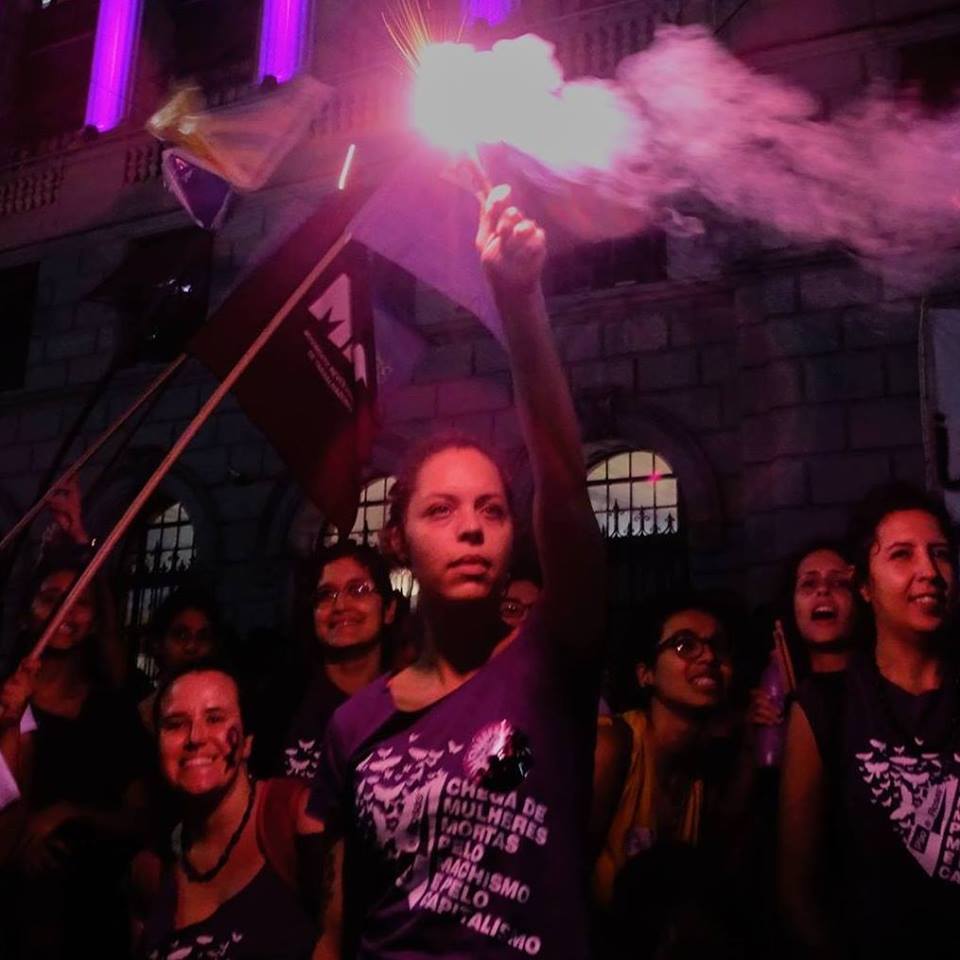
For the right to free and safe abortions!
In many countries, women do not have the right to decide when and how to be mothers. However, the prohibition of abortion does not stop abortions from happening but instead forces women to have them in unsafe and clandestine conditions, causing the death of the poorest sectors of women. We do not have the right to free abortions in hygienic conditions, conducted by competent medical practitioners. Even access to contraception remains difficult.
On the other hand, our children are a “hindrance” to bosses, the vast majority of whom do not provide childcare. Instead, the bosses refuse to pay more social welfare taxes, and fire pregnant women. At the same time, we are told by the family, the state, the church, and the education system that we are not “real women” if we are not mothers.
Thus, we demand that childcare be provided free of charge to working families and paid for by employers and the state in all factories and workplaces no matter what time of day they are working. We demand full rights for pregnant working women as well for working mothers. We fight for sexual education and contraception to avoid pregnancy and free, safe, and legal abortions in order to stay alive. We also fight for the complete separation between church and state.
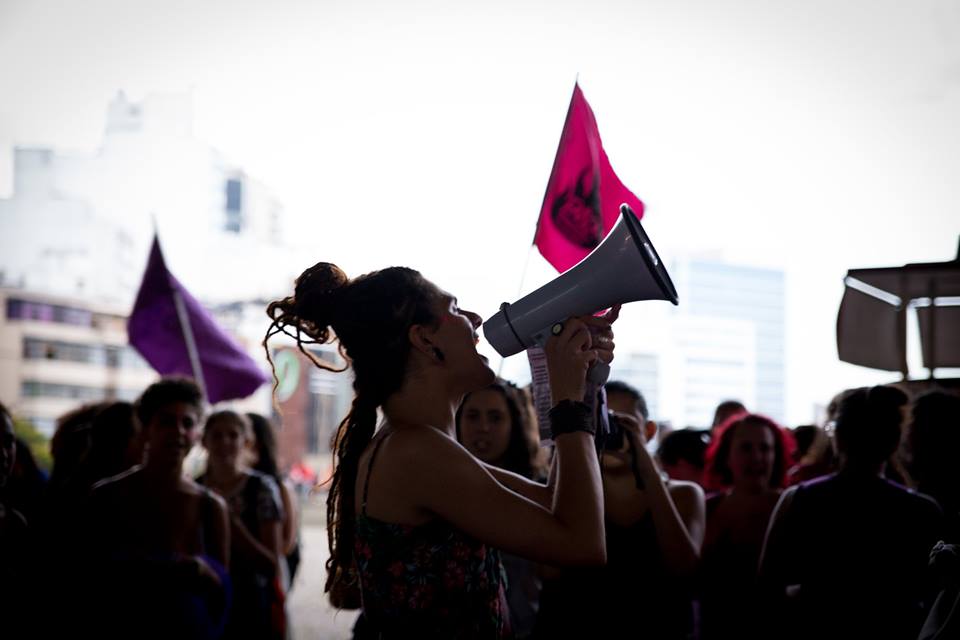
Working Class Women on the Front Lines
The growing proportion of women in the work force reveals the degree of women’s oppression because this growth is concentrated in the most precarious occupations with the lowest safety standards and salaries combined with a high level of inequity. Due to lower salaries than men, worse working conditions, and frequent exclusion from union organizations that fight for workers’ rights, women workers constitute one of the most exploited sectors of the global working class. For many of these women, exploitation comes hand in hand with sexual assault and harassment in workplaces. We do not have the same access to jobs or the ability to climb the career ladder to better positions based entirely on our identities as women. Discrimination starts the moment we enter the workforce — in order to get a job, men are judged by their ability and experience while women are judged based on our appearance and on whether or not we have or want children (often, we are forced to hide their existence if we already have them). Women are judged and fired based on a refusal to submit ourselves to humiliating harassment leads to further exclusion.
This oppression is felt doubly by immigrant women. In the U.S. and in Europe, immigrant women from Latin America, Africa, Asia and Eastern Europe suffer disproportionately as a result of restrictive immigration laws, deportation, political persecution, and exploitation, while the extreme right advances its racism and xenophobia.
Black and indigenous women are among the most exploited and oppressed. Trans women and non-heterosexual women suffer job discrimination, political persecution, and institutional and social exclusion, even in those countries in which anti-discrimination laws, marriage equality, and gender identity laws have been passed. But equality under the law does not mean equality in material conditions.
We fight for an end to precarious work, and for job security and stability for all workers. We fight for equal work: equal conditions, equal rights, equal salary and equal opportunities in training and employment. Furthermore, we demand the distribution of work hours among the employed and unemployed without reducing our salaries. We fight for — and build — committees in defense of the rights of women in our workplaces and our unions. We have have suffered discrimination long enough.
The capitalist structures that push women into wage labor do not remove the responsibility of unpaid work that is carried out in the home, and which doubles the workday for women. Although in advanced capitalist countries and urban centers, there is an increasing tendency to hire domestic workers (a majority of whom are Black and Latina women), this only serves to shift the task to other working families —domestic work is not eliminated on the global scale. In the poorest sectors, in rural areas, and in less developed countries, domestic work falls completely on women and children. This is precisely because unpaid domestic work relieves capitalists of the responsibility to pay their workers for their daily reproduction as a workforce (clothes, food, etc.) which, in turn, increases capitalist profits. Similarly, capital profits by keeping an army of “unproductive ” and unpaid workers who engage in domestic work: the unemployed, children and the elderly. Encouraging and sustaining the patriarchal culture in which housework is the “natural” responsibility of women allows the capitalist robbery of unpaid women’s work, allowing it to remain invisible.
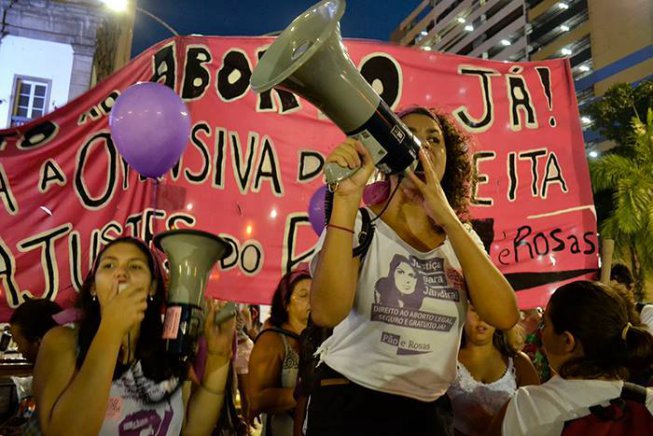
Although patriarchal oppression has existed since ancient times, capitalism has provided ideal conditions, not only for the existence, but also for the strengthening of the oppression of millions of women. Paradoxically it accelerates capitalism’s own death knell since it expands the ranks of the working class with millions of women who are forced to work outside the home. We cannot address gender oppression without taking into account that the great totality of humanity belongs to the exploited classes and that oppression furthers the capitalist exploitation of women.
The members of Pan y Rosas believe that the workers who produce the wealth expropriated by capitalists have the power to end this system of exploitation and oppression. The working class must fight alongside and for all those who seek to emancipate themselves from the yoke of subjugation that oppresses them based on the color of their skin, their sexuality, gender, ethnicity, etc. This alliance, led by those who produce all social riches, is what can truly inflict a mortal wound to capitalism. We cannot trust “oppositional alliances” with governments headed by “progressive sectors” who represent the interests of employers and who live off the exploitation of our labor power. This is why we maintain the necessity of a break with the capitalist state, with the political parties that represent its interests, and with the bureaucratic representatives of the working class who consistently betray workers and their struggles. We, therefore, call for the independence of the working class and encourage all the necessary steps on this path.
Our struggle for the emancipation of women is part of our fight to build a revolutionary party of the working class in every country around the world. It must have an anti-capitalist, working class, and revolutionary program that leads towards socialist revolution by creating a workers’ government that fights to end capitalism and all forms of exploitation and oppression.
The Pan y Rosas Manifesto is addresses the politics of Pan y Rosas around the world. The following two addendum address two specific and central groups in a US context: immigrants and Black women. Other countries included similar addenda to address issues and populations in the context of their own country.
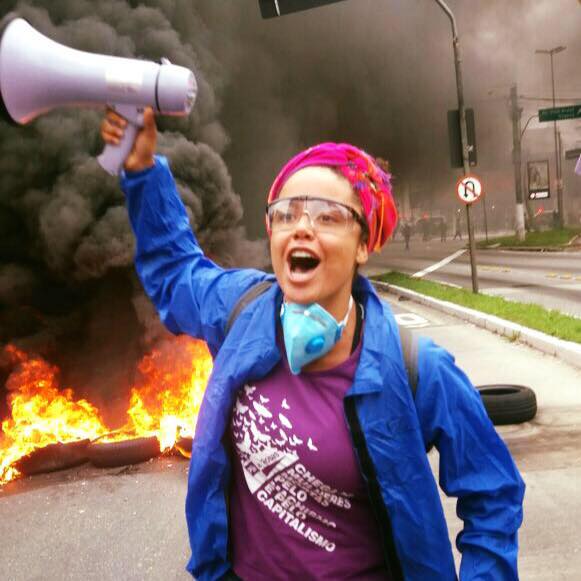
Black Women: A Story of Repression and Resistance
Since Black women were kidnapped and brought to the US, they have been at the forefront of the resistance to oppression. We are on the front lines of movements like Black Lives Matter and the Fight for $15, and feminist movements have Black women at the lead. Many Black women suffer the oppression of the interlinked systems of white supremacy, patriarchy, capitalism, and imperialism, and many organize to resist.
From the moment when Black people stepped foot on the stolen land that is known today as the United States, racism was used as a justification to exploit our labor. Enslaved Black women and men worked hard in the fields, creating wealth for the U.S., while being tortured in every way imaginable. And yet, Black women resisted; women like Harriet Tubman and later activists like Sojourner Truth called for voting rights and equal rights for Black women within the suffrage movement, despite the racism she and other Black women suffered within the movement. Today Black women are still fighting at work, in the community, and against the state.
A socialist and revolutionary feminism must give great attention to the most oppressed and exploited sectors of the working class, demonstrating that Black women’s struggle can only be victorious when it is part of a revolutionary struggle against the capitalist system that to this day seeks to profit from the legacy of slavery. To us of Pan y Rosas, the struggle against racism is a priority and should be taken up by the entire working class.
Black women are oppressed around the world, directly and indirectly, by US imperialism. We stand on the side of those resisting imperialism and against those who bomb, kill, and imprison us. Our resistance is against the attempts to make the very few Black women billionaires and politicians our symbols of liberation. The former first lady Michelle Obama did not oppose her husband’s bombing Black women in Somalia and Libya. She represents and strengthens the system of mass incarceration, police violence, and imperialist violence that her husband led.
Likewise, women like Beyoncé and Oprah Winfrey- the few Black women billionaires- are not the key to Black women’s liberation. It is due to the struggles of Black women that positions of power are even open to us. But representation ain’t liberation. We, working-class Black women are the leaders we have been waiting for! Leon Trotsky once said, “those who most suffered with the old are the ones who will struggle most forcefully for the new.” In a few words, this explains the revolutionary force that Black women have shown throughout history and will continue to show in future struggles. As the brave Assata Shakur (quoting Karl Marx), liberated from the prison by a solidarity movement, said “we have nothing to lose but our chains”. We come from repression, and we come from resistance. The fight against capitalism will have Black women on the front lines, alongside the working class and the rest of those most marginalized by the capitalist system.
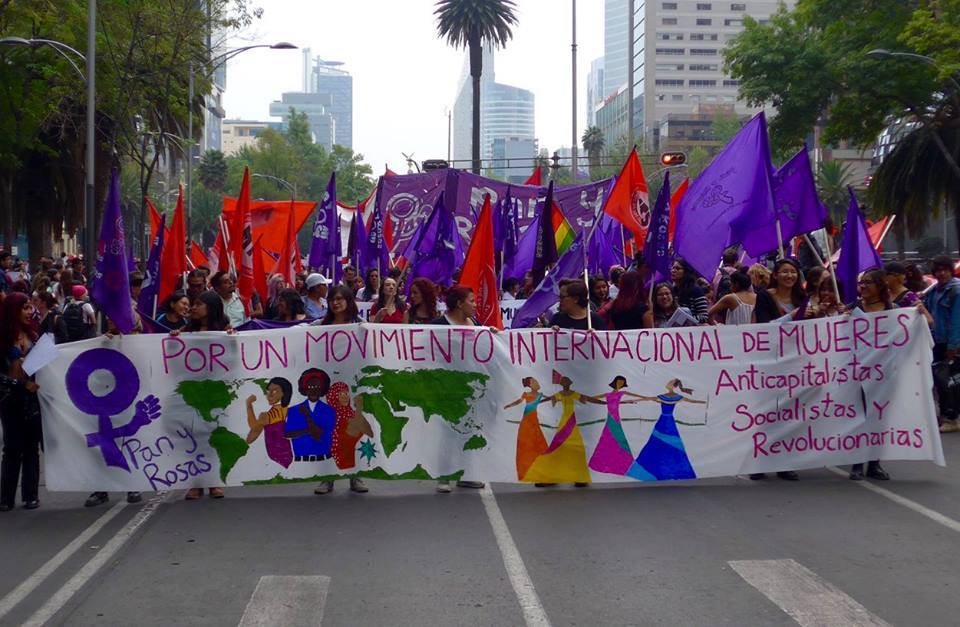
No Ban, No Wall: Immigrant Women in America
Donald Trump’s America has given rise to increased attacks and violence against immigrants in the U.S. From the travel ban, to the border wall, to his hate-filled speeches against Muslim and Mexican immigrants, Trump’s anti-immigrant rhetoric and policies are central to his political project.
The women of Pan y Rosas are on the front lines of defending immigrants in the United States who come from all over the world. It is estimated that there are currently 10 million Latin American women working in the United States. These women perform some of the most difficult low-wage jobs, and their work is invisibilized since many of them do domestic work. They are discriminated against because they are women and because they are immigrants. Countless immigrant women are separated from their children either because they have to make money to send home in order to provide a better life for their kids, or because they are deported. When crossing the border, women routinely suffer sexual abuse, extortion by immigration authorities, and persecution by organized crime. Many are abducted for trafficking or murdered along the way.
We fight anti-Muslim xenophobia that has made Muslim immigrants, particularly women, targets of hate crimes and violence in the U.S. The violent and Islamophobic policies and rhetoric of Trump and his cronies are the domestic manifestation of the on-going drone wars in the Middle East.
We fight against Trump’s wall, against the Muslim ban, for the opening of the border, against deportations, and for the rights for migrant women, including health insurance, social security, and child care. At the same time, we speak out against imperialist oppression around the world. We fight against the economic policies that create misery for Mexican and Central American people, forcing many to immigrate to the U.S. We fight against the military policies that have demolished cities and have created the current refugee crisis.
Footnotes
(1) We primarily discuss the West because the historical processes of the countries in the Asia and Africa are different, so we do not want to generalize. The experience of the Pan y Rosas groups are from Latin America, Europe and the US.
(2) We have deep differences with these radical feminist currents who, in their majority pose the emancipation of women as one of women against men. This time period fomented debates about whether the basis of women’s oppression is the appropriation of women’s reproductive capacity and whether men exploit women’s non-wage labor in all social classes, including their love and affection, and appropriate the products of this labor. Socialist feminists, who utilized the historical materialist method of Marx and Engels in these debates, highlighted the inextricable relation that exists today between patriarchal oppression and capitalist production in which domestic work has a fundamental role in the unpaid reproduction of the labor force.
(3)The organizations of the Trotskyist Fraction-Fourth International are: Revolutionäre Internationalistische Organisation (RIO) in Germany; Partido de los Trabajadores Socialistas (PTS) in Argentina; Liga Obrera Revolucionaria por la Cuarta Internacional (LOR-CI) in Bolivia; Movimento Revolucionário de Trabalhadores (MTR) in Brasil; Partido de Trabajadores Revolucionarios (PTR) in Chile; Clase contra Clase (CcC) in the Spanish State; Left Voice in the United States; Courant Communiste Révolutionnaire (CCR) in France; Movimiento de los Trabajadores Socialistas (MTS) in México; Liga de Trabajadores por el Socialismo (LTS) in Venezuela, and FT-CI in Uruguay. In the United States members of the Trotskyist Fraction put forth the publication, Left Voice.


